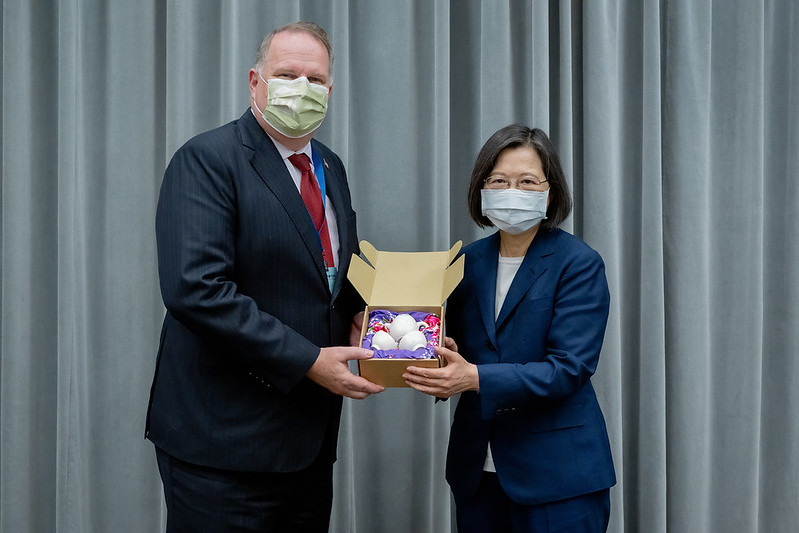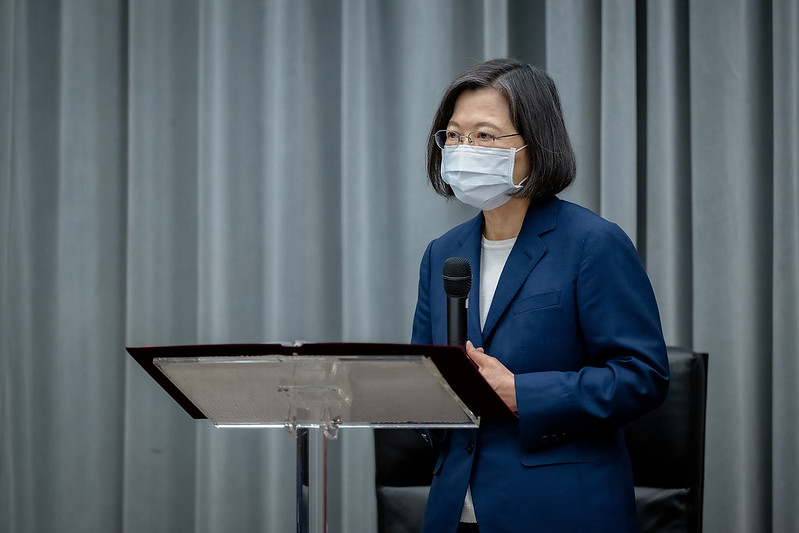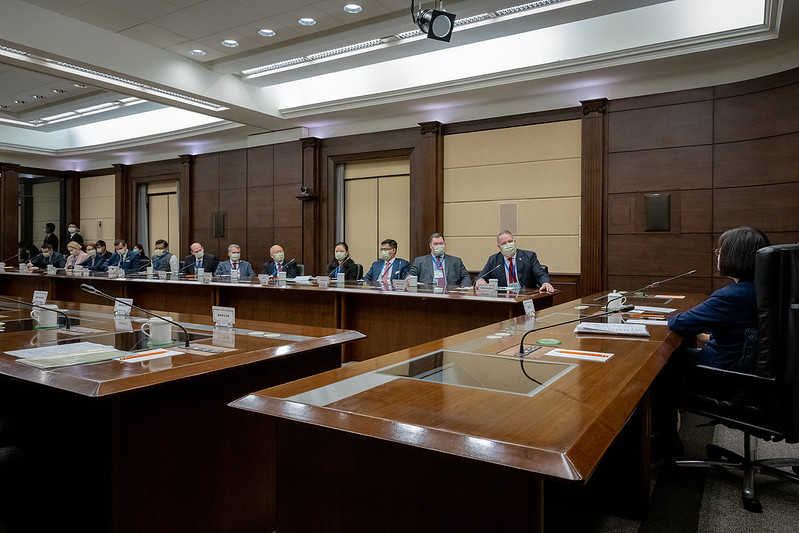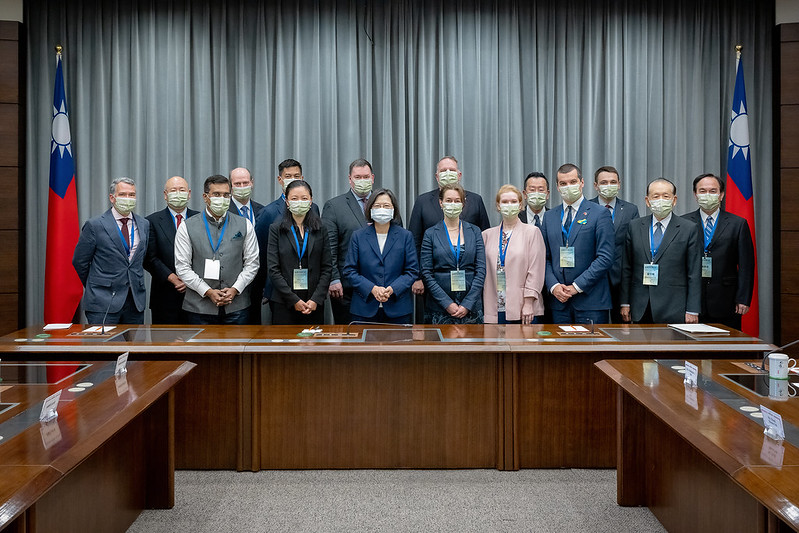News & activities
 News releases
News releases
On the morning of November 3, President Tsai Ing-wen met with participants in the 2022 Taipei Security Dialogue, hosted by the Institute for National Defense and Security Research (INDSR). President Tsai said that INDSR was founded four years ago as a national-level defense think tank to give us a more comprehensive grasp of changes in the strategic landscape and to strengthen dialogue, cooperation, and exchanges between Taiwan and other countries in the region. Nothing that the Taipei Security Dialogue is a key program in efforts by INDSR to advance international exchanges, President Tsai welcomed the participants to deepen cooperation with INDSR and Taiwan's other think tanks, and said she looks forward to further such exchanges in the future.
A translation of President Tsai's remarks follows:
Welcome to the Presidential Office. The 2022 Taipei Security Dialogue successfully concluded yesterday. I would like to thank all of our distinguished guests who traveled long distances from various countries to take part in this event. Your participation reflects the importance you place on Taiwan's security and peace.
Russia's invasion of Ukraine earlier this year has rallied democratic nations in support of Ukraine, and has brought attention to Taiwan's security and peace. Especially since US House Speaker Nancy Pelosi's visit to Taiwan this past August, China has conducted military exercises in areas around Taiwan, prompting further concern across the international community.
I want to reiterate that Taiwan is a force for good, maintaining peace in the region and holding firm in the defense of democracy and freedom. We do not engage in provocation or rash behavior. In the face of authoritarian expansion, Taiwan will continue to bolster cooperation with democratic partners to safeguard our shared ideals and values.
Over the past few years, we have actively enhanced our self-sufficiency in defense and our asymmetric warfare capabilities, with concrete results in our domestic production of aircraft and naval vessels.
Just two days ago, I attended a briefing on the achievements of the F-16 maintenance center, which was jointly established by Lockheed Martin, the US manufacturer of F-16 fighter jets, and Taiwan's Aerospace Industrial Development Corporation. This center symbolizes the success of Taiwan-US defense industry cooperation.
Aside from enhancing foreign defense exchanges and cooperation, we have established the All-out Defense Mobilization Agency to strengthen combat training capacity and our reserve forces.
With us here today is Chairman Huoh Shoou-yeh (霍守業) of INDSR, a national-level defense think tank founded four years ago to give us a more comprehensive grasp of changes in the strategic landscape, and to strengthen dialogue, cooperation, and exchanges between Taiwan and other countries in the region.
The Taipei Security Dialogue is a key program in efforts by INDSR to advance international exchanges, and the inclusion of such influential experts and scholars at this event demonstrates the success of its years of efforts. Distinguished guests, your nations' experiences in and approaches to national defense and mobilization are important references for Taiwan's own defense reforms. I thank you again for supporting Taiwan and for sharing your valuable analyses and recommendations.
Taiwan stands on the frontlines of defense against authoritarian expansion, and we are happy to share our experience with you. I welcome all of you to deepen cooperation with Taiwan's think tanks, especially INDSR.
In closing, I wish you all a fruitful visit and look forward to engaging in further exchanges with you in the future.
In remarks on behalf of the visiting international participants in the 2022 Taipei Security Dialogue, former US Deputy Assistant Secretary of Defense for East Asia Heino Klinck said it was an honor to have the opportunity to meet with President Tsai, and added that while the participants come from different countries, they are all friends of Taiwan and support what it stands for. He stated that Taiwan remains a beacon of freedom and an example to all of us of what can be achieved when people work with common purpose to build a prosperous, pluralistic, liberal democratic, and capitalist society that values individual freedom without compromising the collective well-being of a nation.
Former Deputy Assistant Secretary Klinck expressed his belief that the juxtaposition of democratic Taiwan with autocratic China could not be more stark, and highlighted that, aside from what is already commonly known about the Chinese Communist Party (CCP), its policies, and its objectives, the coronation of Xi Jinping at the CCP's 20th National Congress again underscored that there is but one voice in China – that of General Secretary Xi. He observed that Xi had removed any last vestige of potential dissent from the party leadership, had his predecessor physically removed from the Great Hall of the People [in Beijing], installed his coterie of diehard loyalists into the Standing Committee of the CCP Politburo and Central Military Commission, and warned the Chinese people and the rest of the world of a great struggle ahead.
Former Deputy Assistant Secretary Klinck further stated that General Secretary Xi's remarks at the party congress served to underscore that the world can only anticipate a doubling down of the aggressive and revanchist policies that have been on the rise over the last decade. He noted that there has been a realization across the Indo-Pacific region and the globe that the so-called "great rejuvenation of the Chinese nation" equates to an imposition of the CCP's national security, economic, and development interests on other countries.
Former Deputy Assistant Secretary Klinck pointed out that China has chosen systematic competition with like-minded democratic nations in the CCP's attempt to rewrite the existing order to its benefit, and said that the CCP views competition along all facets of what it describes as comprehensive national power, including in the economic, technological, political, and military dimensions.
Former Deputy Assistant Secretary Klinck emphasized that it is important for like-minded nations such as those represented at the meeting to band together to strengthen deterrence in all domains, in order to ensure that competition does not lead to conflict. He said that today, with war raging in Europe, we must come to terms with the fact that we live in a world in which conflict cannot be ruled out, and stressed that we must work even harder, both to try to prevent conflict and also to ensure that we can prevail if conflict is thrust upon us.
Former Deputy Assistant Secretary Klinck expressed his belief that difficult decisions lie ahead in all of our nations, amongst our citizens, and for our leaders, with political and military as well as social, educational, and economic implications. He added that the context of these decisions could not be clearer, in that the CCP's intent to revise the international order to favor Beijing's authoritarian system and national interests makes it clear what the world would look like if the CCP makes the rules, sets the standards, and establishes norms. He pointed out that all one has to do today to understand this potential world is to look at Shanghai Disney, ask the employees of the Foxconn factory in Zhengzhou, China, or try to seek freedom in Hong Kong.
Former Deputy Assistant Secretary Klinck stated that he nevertheless remains an optimist that, with leaders such as President Tsai, our nations will make the right decisions, as the consequences are so unambiguous for all who have both been privileged to live in democratic societies and have experienced authoritarianism firsthand. He stated that he and his fellow participants will strive to continue to support Taiwan in ensuring that its people can determine their own path without fear of intimidation or reprisal.
Former Deputy Assistant Secretary Klinck concluded his remarks by once again thanking President Tsai for hosting him and his fellow participants.












